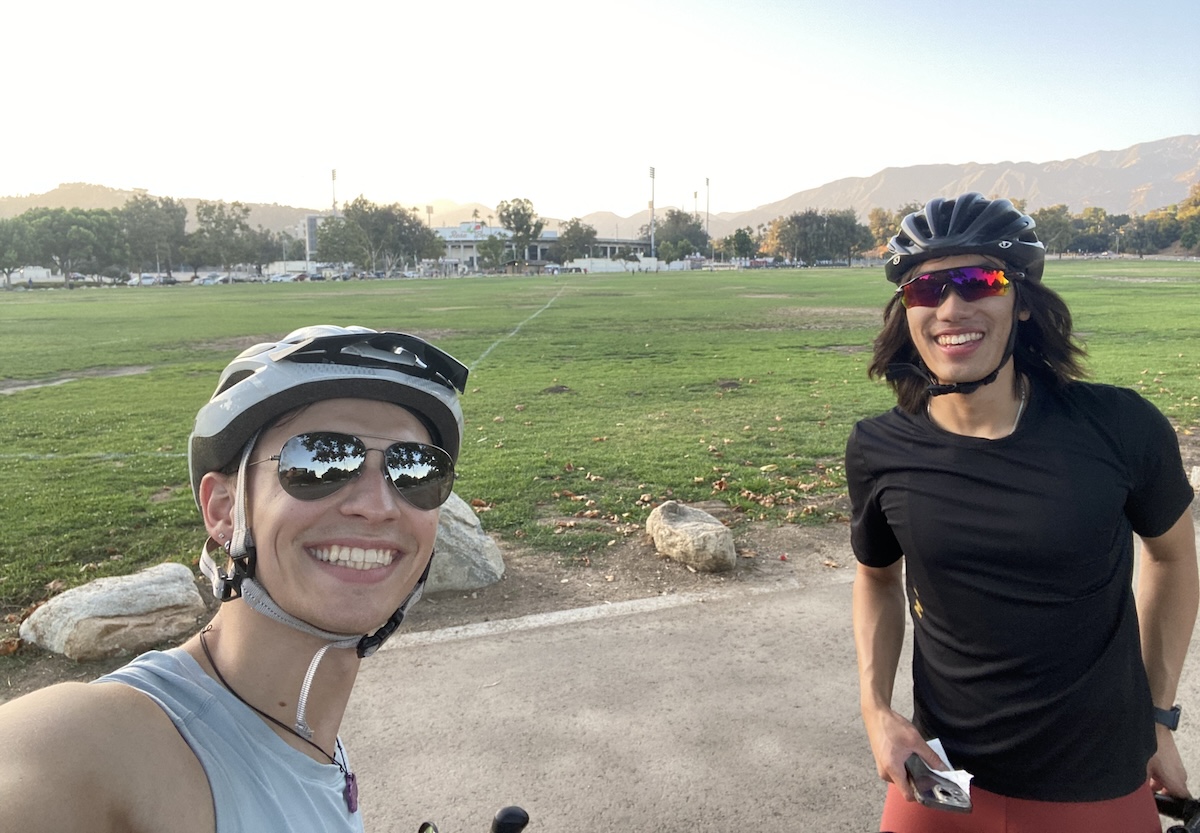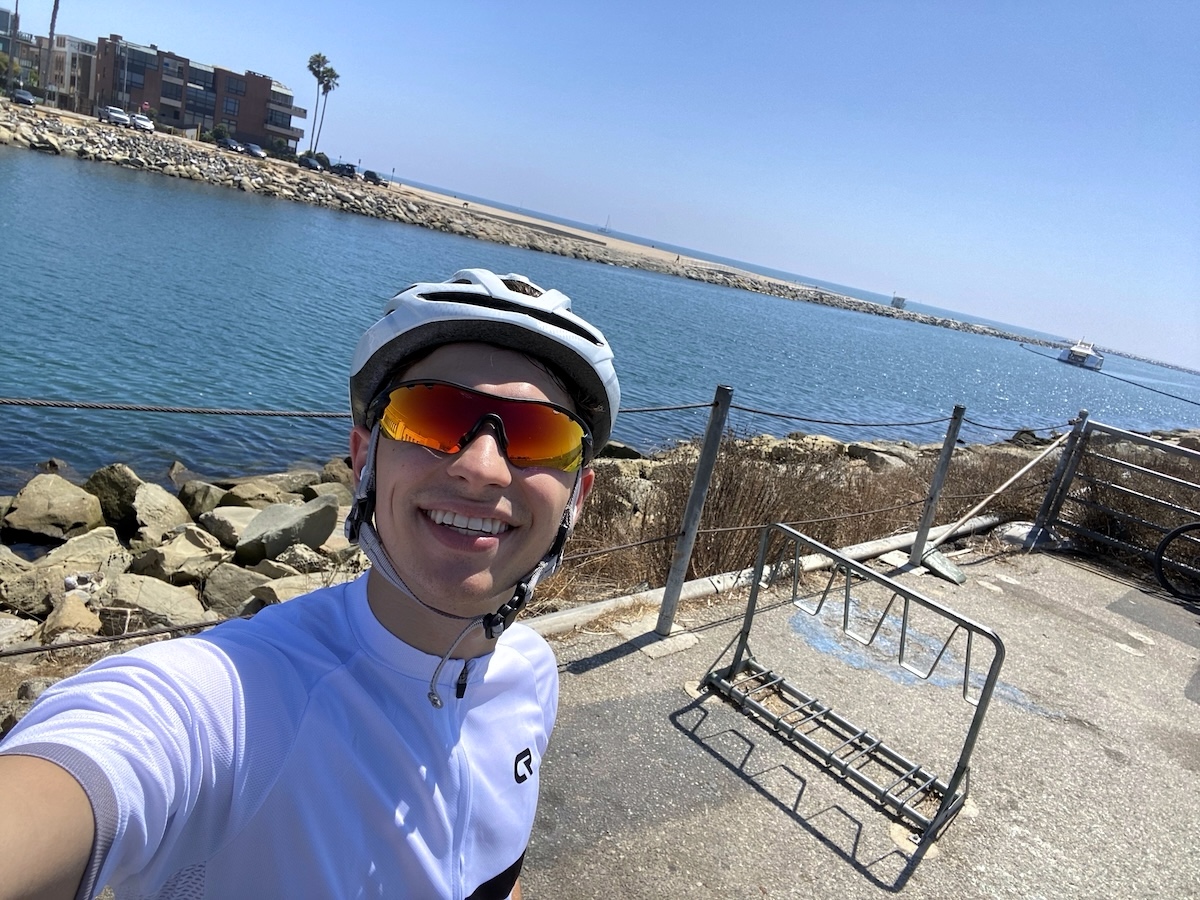Student Blog
Mason
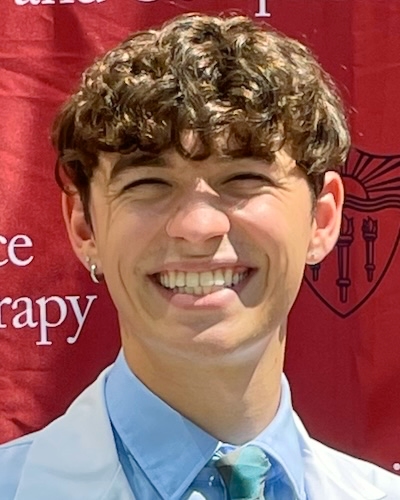
A Story You Won’t Forget ⟩
November 8, 2024, by Mason
College admissions can be stressful, in fact when I think back about my high school years I can say without a doubt that the college search and application process was one of my most stressful moments. One of the hardest parts about it, at least for me, was the sheer number of people telling me different things to focus my energy and attention towards. I had my parents whom I desperately wanted to make proud, my older sister who was already succeeding in college, high school ‘college counselors’ who thought I shouldn’t tunnel vision my aspirations solely on occupational therapy, and of course all of those supposed “admission experts” on youtube describing ground breaking news on how to get into a top school. Everyone always had something to say, some magical advice, and having to sift through all of it was exhausting. College applications often force you to define yourself in a few short pages, and I for one was often left feeling inadequate putting my whole life down on a page.
A little about me, I had the privilege of earning a paid work study job at USC’s Office of Admissions. There I served as a student ambassador and tour guide for all 4 years of my undergraduate education. There were many great benefits and takeaways from my experience in the position, but for the sake of staying on topic I will stick to what’s relevant. Across my years in the role I was able to work directly under several fantastic admissions counselors who not only acted as my bosses and mentors, but also openly shared with me an honest window into the college admissions process at USC. My supervisors were some of a large number of USC counselors who directly read applications and played a key role in the admissions process. I cannot speak for other universities, but I think the most interesting thing I realized throughout my time learning from them is how human the college application process really is. When you are in high school and applying to these big trailblazing universities it’s easy to forget that at the end of the day there is a human being reading your application. A real person who feels, empathizes, and hopes to connect with each and every student they learn about. When any of my co-workers or myself would ask our supervisors what is the best advice we should give to prospective USC students on an application or college essay, they would always tell us the same thing:
Tell us a story we won’t forget.
So what is my magical advice you might ask? What secret golden ticket am I offering to you today. The best advice I can give to anyone about applying to USC or any college for that matter, is to be your most honest and authentic self. It’s so easy to get swept up in the narrative of trying to make yourself into a person that college’s “want” to see. Whether it be through the extracurriculars you engage in, the classes you take, or the essay you use to paint a picture of yourself, let your true narrative and story guide your application. If you take the time to create something that reflects the beauty and passion of your unique human experience I guarantee you it will stick with a person better than trying to model some unattainable paradigm.
My favorite thing about occupational therapy is that each and every patient you see has a different story, a different meaning that they derive from the activities that fill their life. Let your meaning shine through your work, and always remember that there is never just one path to your future goals. If the first path you choose closes, take a deep breath and head down the next one that comes your way.
That’s all for now, and Fight On!
⋯

A Legacy of Hard Work, Perseverance, and Occupation ⟩
September 27, 2024, by Mason
Beginnings and Endings School/Life Balance
Hi everyone! In my introductory blog post, I talked to you all about why I chose to take on the challenge of becoming an occupational therapist. In case you missed it, let me give you a refresher. My mother is a pediatric occupational therapist and has served various populations of children with special needs and developmental disabilities for over 30 years. Growing up around my mother and watching her treat and impact the lives of the children she worked with sparked my passion and lifelong goal to help others. My mother always taught me that no matter what you do, you should leave the world better than you found it, and use your energy, health, and opportunities to help those who have less or do not have the same luxuries. Throughout this program, there have been many times when I doubted myself and my abilities to succeed as a student, clinician, and overall individual. But in those moments I have always had my mother and her lessons to support me.
My mother has always been a key pillar of support in my life. However, my mother was also not shy about pushing me to do my best. Growing up, my mother always had one rule: it was okay to fail as long as you tried your best. In every moment of failure or setback throughout my college years so far I always tried to remember that simple lesson because I knew that my best was within reach if I worked hard and put in the effort. It wasn’t easy to move across the country to a state I had barely visited, work multiple jobs to support myself throughout my education or start a full graduate course load while my friends moved on to full careers after their undergrad. College is not an easy challenge, and it’s not meant to be. After 4 years of strong effort, I still find challenges and overwhelming moments every other week. But I know I can get through it because I have the people around me that make me feel supported.
In a funny way life always comes full circle. This year to my utmost pride, pleasure, and enthusiasm my mother started a new journey of her own and returned to school to earn her post-professional doctorate in occupational therapy. Despite not being in school for almost 30 years and diving into an educational landscape that has changed fourfold, she’s taking on this challenge to grow and better herself, and I couldn’t be more proud. As children, you always view the relationship you have with your parents as a one-sided transaction. They teach you, they support you, and they help you grow to dreams and goals they know you can accomplish. However, as you inevitably grow up and expand in your ability to understand those around you, you begin to realize how much you impact their lives as well. We can teach our parents, we can help them grow, but most importantly we have the ability to support them amid the vulnerability that makes change so scary.
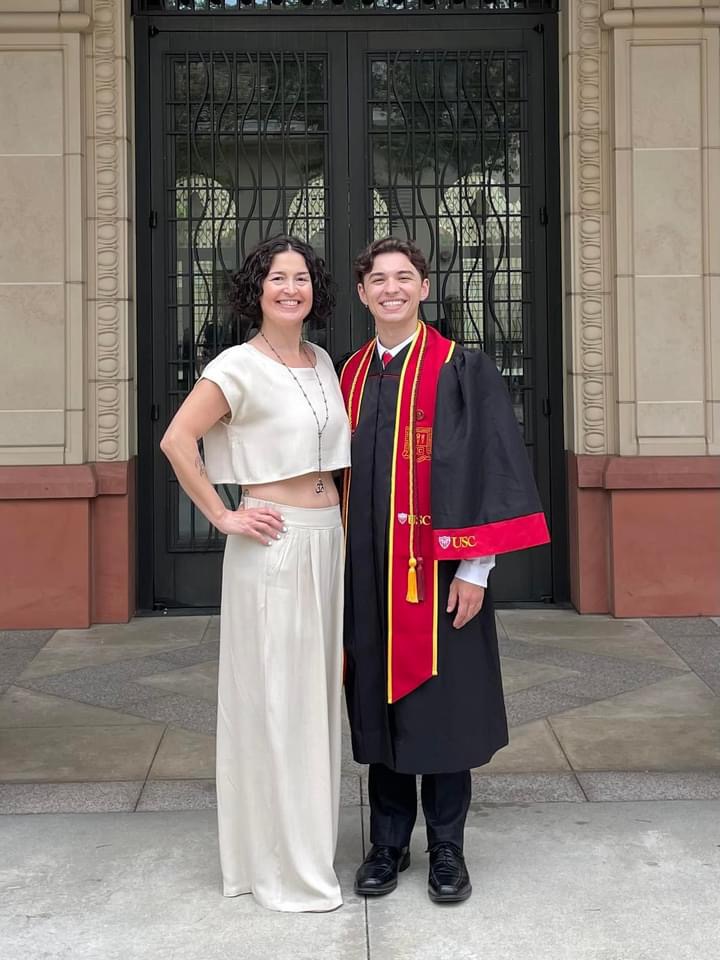
My mother inspired me to become the person I am today, and today I’m lucky enough to inspire my mother to reach the exact same potential she has always seen in me. So when you’re reflecting on the challenges and obstacles that stand in your way, don’t ever forget about the people in your life that lead you to greatness. Cherish those who have always supported you and take any opportunity you can to return the favor by supporting them.
That’s all for now, and remember to Fight On!
⋯

My First Summer Semester, What a Ride! ⟩
August 22, 2024, by Mason
Living in LA School/Life Balance
Completing finals this past week marks the end of my first-ever summer semester in college, and I can confidently say that it was not the experience I expected. Now let me be honest with you all, when I first found out that I would have to take classes for the majority of the summer I was not too pleased. The summer had always been my time to let loose amidst busy semesters of OT courses and I was scared that the lack of a break would feel overwhelming. My first summer semester also happened to be my first semester as an official graduate student. It was quite an interesting experience having my entire family fly down on a Friday afternoon for the pomp and circumstance of my undergraduate graduation only to then have my first day of class bright and early the next Monday morning. Despite being a full-time student throughout the summer I still ended up having quite an enjoyable experience. For me personally, I always get a certain feeling or mood when the summer comes around. I don’t know if maybe it’s the warmth or the opportunities to get out into the sunshine, but summer always brings me a feeling of joy and endless possibilities. Even though I was on my way to class in the morning, I couldn’t help but smile in the sunshine, sunglasses donned, and iced coffee in hand.
For me, I took my summer semester as an awesome opportunity to explore a new season in Los Angeles for the very first time. I chose to embrace being a California college student and had a great time while doing it. Initially, I thought having class would take away from my opportunities to engage in the activities I enjoyed, yet I found quite the opposite happening this summer. In fact, I was actually able to explore and try many new things I never expected. One of these activities was biking. I have always loved biking, but I have also always wanted to take the activity from simple fun to a serious sport I could enjoy. This summer presented me with the awesome opportunity to do that. I explored new areas of LA I had never experienced like scenic coastal roadways, surprisingly lush river canal trails, and open northern landscapes. I was even able to create and develop new meaningful relationships and friendships with my classmates who shared my passion for the activity.
OT school can certainly have its ups and downs, and there are definitely some overwhelming moments, but for me what gets me through it is making the time for all the things I enjoy. Balancing the workload and making time for other meaningful occupations can take time. It is an intricate dance that only experience can teach you to master. But once you get in the swing of each semester, you’ll find all of your responsibilities get gradually easier to manage. Our meaningful activities are what drive us as passionate and independent individuals. They are the reason we get up each morning, and they are the reason I continue to work hard towards my dream of becoming a clinician. My biggest piece of advice for anyone looking to join our OT program or any other program like it is to make time for the little things that bring you joy. I strongly believe that when you do you will concentrate better, learn better, and grow as a person throughout your time here.
That’s all for now and Fight On!
⋯

Working in College Is Not One Size Fits All ⟩
July 18, 2024, by Mason
Getting Involved Life Hacks School/Life Balance
Throughout my undergraduate and graduate education at USC, I have always had some form of job, and these were often funded by federal work-study. Federal Work Study is a government-funded student aid program that students may be eligible to receive depending on their financial situation as governed by the yearly FAFSA. The full ins and outs of the program can be a bit confusing, but to simplify it, if a student is awarded federal work-study, the government will give an employer money to pay your wage and to incentivize the hiring of you as a worker. In my personal experience, having federal work-study was extremely helpful as an undergraduate student, as many of the on-campus jobs such as working at the library, bookstore, etc. would be much more likely to hire a student with a federal work-study award. That is not to say that there are no jobs for those without this distinction. Many of my close friends and even myself during the years I did not receive this award were still able to find great employment opportunities and jobs that were flexible enough to accommodate a college student’s scheduling needs. The key takeaway from this though is that federal work-study can be a great opportunity and tool in finding employment during college, so make sure to remember to fill out your FAFSA accurately each year and not to overlook the award in your financial aid package.
Now on a more personal note, I’d love to talk about my experience so far as a working college student. I was fortunate to be raised in a very hard-working family, where both my parents worked full-time jobs while raising my two sisters and me. While my parents were working hard in their careers, my sisters and I were taken care of by my Nonno (grandfather). My Nonno immigrated to America from Sicily when he was just 19 years old and it is from him that I owe my work ethic across all of the jobs I have worked so far. No matter what was going on in my life, my Nonno always raised me to be a hard worker. He taught me that if you wanted something in life, that it was your responsibility to work hard to achieve it, and that any aspiration no matter how big was achievable with hard work & determination.
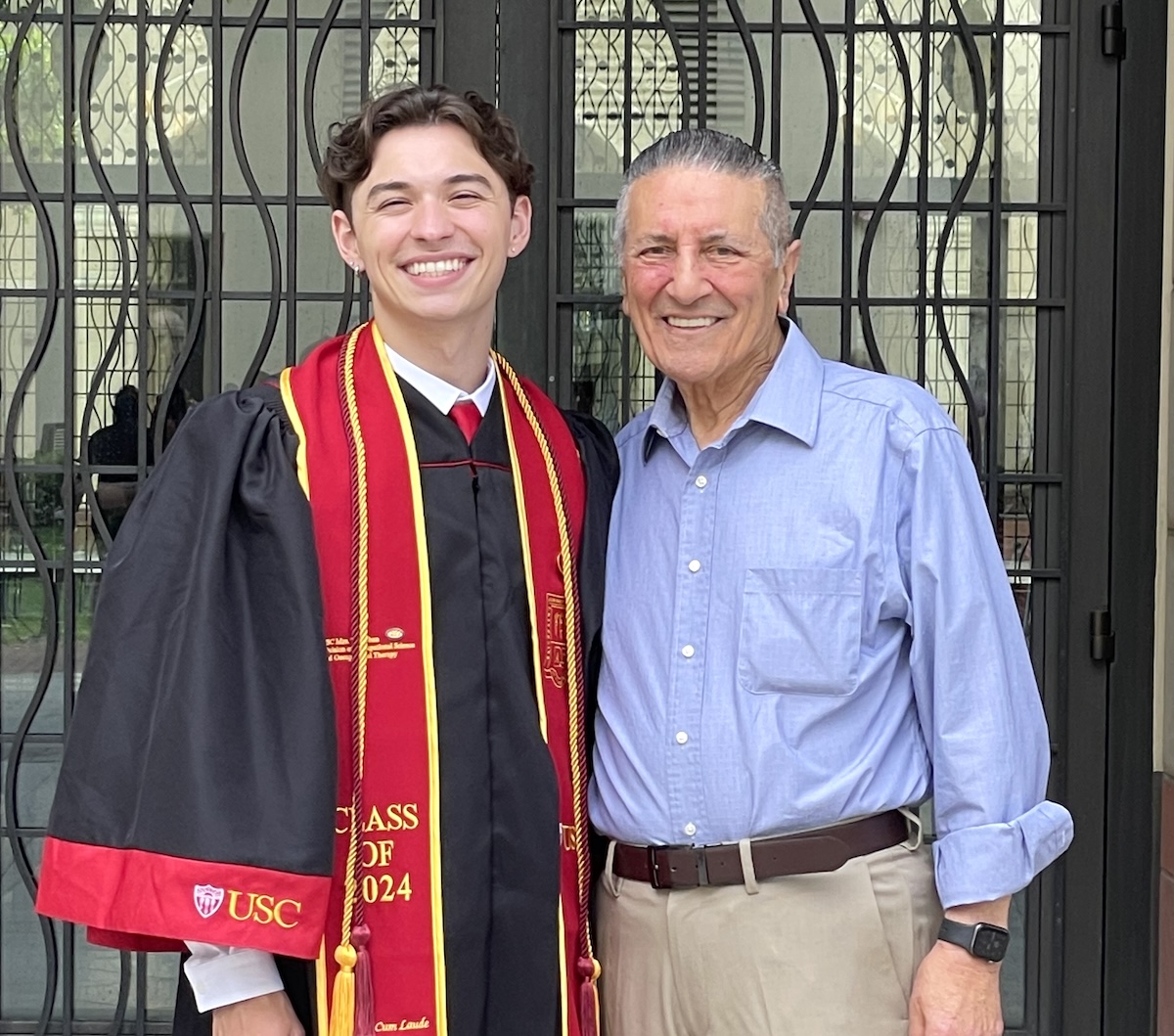
Mason & Nonno at USC graduation
I have worked many jobs in my life such as being a tutor, a beach lifeguard, a resident assistant, and a campus tour guide, and now I enjoy interacting with my community through blogs like this as a Chan student ambassador. For me, work has always brought me a sense of meaning and purpose. The idea of getting a job and working during college was never really a question in my mind, rather, it was more of an understanding I had made with myself to continue to work hard towards my goals. Students choose to work in college for a multitude of reasons, many work hard to pay for things like books, food, and rent. Some students choose to work so that they can have money to support themselves in meaningful activities like sports, exploring LA, or getting dinner with their friends. Finally, many students choose to work because having a job helps them derive meaning and purpose with their time in college. I have often found that people do not simply fall into one of these roles, rather, most students I know tackle every one of these goals simultaneously.
Working in college is not one size fits all. Each and every one of us is a different person, with different goals & aspirations, different finances, and importantly, different needs to succeed during our time here. So when considering whether or not to work during your academic pursuits the best advice I would give is to be honest with yourself and to think about what you need to succeed. Choosing not to work is just as meaningful as choosing to work if a job would jeopardize your success as a student. My advice, be open to trying new things! If a job doesn’t work out you can always stop and you can always try something else instead. Working in college is not perfect for everyone, but it can be a fantastic opportunity to set yourself up for financial, professional, and personal success in your future life and career.
That’s all for now, and remember to Fight On!
⋯

The Transcontinental Bachelor’s to Doctorate Student ⟩
May 24, 2024, by Mason
If you asked the average 17-year-old kid if they wanted to commit to a 6+ year program and move across the entire country they would probably look at you like you are crazy. This was the exact reaction I received when I told my peers, teachers, and even family members that I had decided to commit to USC Chan’s Accelerated Bachelor’s to Doctorate program as a senior in high school. Of the many concerns that people had around me, the biggest question people asked me was “Are you sure this is what you want to do with your life?” I remember that 17-year-old me would always get so bothered by this question, I couldn’t possibly understand why the people around me had so many concerns about me going into this program. Looking back on these memories almost 4 years later, as a more mature and grown person, I can say that I finally understand why people had these concerns. Choosing to go to college is one of the biggest decisions that people will make in their lives. It is an opportunity that will shape your career and your opportunities, and most importantly it will shape you into a hardworking adult capable of building a life for yourself. So, it’s understandable why those around me were hesitant that I made this decision so early on and so young. However, let me tell you a little bit more about the transcontinental Bachelor’s to Doctorate student and why after 4 years I am still just as passionate, driven, and heart set on becoming the best OT I can be.
I grew up in Sandy Hook, CT, a small east coast town that for most of my childhood life you would probably have never heard about. That is until December 14, 2012, when my town was victim to a historic school shooting that rocked the nation. Although the lived experience of this tragedy is not my story to tell, what I will share is the power and passion of the community I grew up in. I grew up in a town of resilience, made up of families, educators, and activists who set out to better the world around them. In the face of the greatest tragedy one could experience, I witnessed the greatest display of humanity and community that my town could offer. Even now, almost 3,000 miles away, I still remember these values of kindness and community and let them guide my actions.
My mother is an occupational therapist who works in the pediatric setting. Growing up and watching my mother practice taught me not only the importance and value of occupational therapy for children but also the understanding that every individual’s occupations have meaning. Whether it be a child playing with toys, an athlete competing in their sport, or me making my favorite latte in the morning, there is an inherent beauty in the meaning that comes from doing what we love. In the face of disability, illness, and life changes people lose that ability to do what they enjoy. My entire passion in life has always been to help those around me. So why at 17 did I choose that I wanted to be an occupational therapist? Because I know occupational therapy in its simplest form is helping people live their lives meaningfully. Because I know that as an occupational therapist, I can change the lives of my patients for the better.
Looking back, if I had the chance to talk to that 17-year-old high school student, contemplating moving thousands of miles from home to come study at USC, I wouldn’t change a thing. So to all those considering this program or any program for that matter, here is my biggest piece of advice. Find the passion that gives you meaning, and that is strong enough to drive you across the country to achieve your dreams. Although many will doubt you in life, let your passion drive you towards your goals and work hard to achieve them. Fight on!
⋯






